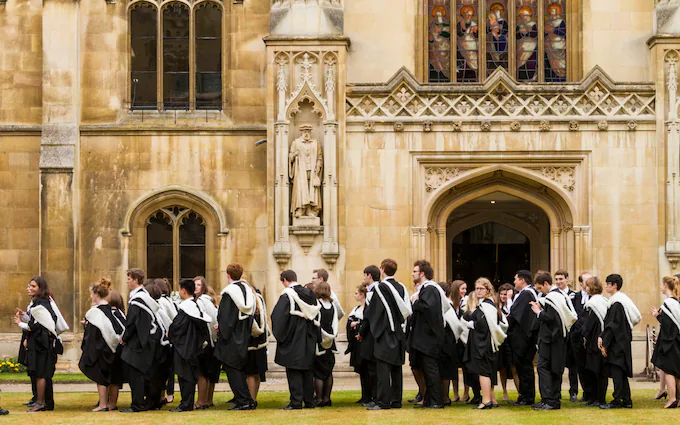British academia leads the world in research, innovation, and creativity. The U.K. is ranked third in the world for published scientific research alone, with around 200,000 citable publications in 2020. Yet, U.K. universities are far from leading the world in academic freedom.
Liberal identities have become dangerously intertwined with the identities of the institutions. In recent years, the change in university political preferences have been trending to the left-wing, with fewer than 20% voting for right-leaning parties and 75% voting for the Labour, Liberal Democrat, or Green Parties.
Faculty influence plays a large role in creating an atmosphere of political censorship in professional and social contexts. YouGov conducted a survey consisting of 820 currently employed and retired academic staff regarding whether the staff felt that there was a “perceived hostile climate towards one’s political beliefs” at the time they were working. Around 65% of people who identified as “very right wing” and nearly 50% of people who identified as “fairly right wing” reported experiencing a hostile work environment due to their respective political beliefs. Policy Exchange reported that 72% of academics who supported “Leave,” or exiting the European Union in the June 2016 referendum, reported that they felt uncomfortable expressing their beliefs. These results demonstrate that U.K. educational institutions are failing to protect viewpoint diversity, an instrumental feature necessary for healthy political discourse.
Social Pressure
Most concerningly, intellectual conformism risks fostering groupthink behavior. Groupthink occurs when people make decisions based on the urge to conform. Groups tend to prioritize the group’s identity, in this case, the identity of educational institutions, over individual identity. The majority always rules.
Indeed, most professors cite social pressure as the reason for self-censorship. An anonymous responder to the YouGov survey expressed fear that expressing their views would “harm [their] reputation in the university.” Conservative-leaning professors fear writing on topics ranging from economic issues such as energy price cap policy and digital market reforms to social issues such as abortion and religious liberty.
More than anyone, faculty members are supposed to create a comfortable environment where political discourse, aside from the content, should be encouraged. It is the epitome of what drives intellectual curiosity. Through the exchange of ideas, students will be able to gather a more comprehensive understanding of the world around them. Without the encouragement of the professors, who serve as guiding role models in this process, students will not feel comfortable to participate in this exchange, producing a close-minded collegiate class.
Intellectual curiosity and discourse is driven by dissent, stimulated by heated disagreements, and extremely pertinent to the foundation of higher learning. The expectation of universities as the “marketplace of ideas” has been overcome by the pressing reality of how universities actually function: as a marketplace of a singular popularized idea.
The so-called marketplace of ideas where disagreement and discourse are freely encouraged has transformed into a hotspot for censorship and alienation. The very function of “free speech” is to protect all kinds of speech, whether widely agreeable, controversial, disagreeable, or even offensive. Universities especially hold an obligation to foster an environment of quality discourse—an environment that institutions cannot build without conflicting debate.
The Effect on Research
This pattern of self-censorship inevitably has a domino effect: since professors lack the space to develop their own opinions, students will not be able to find research projects to work on that resonate with their passions and opinions.
The content of research output is highly dependent on the political environment instilled in the workplace. One professor answering the YouGov survey explained that they “have research ideas that I have not pursued as I think they would have negatively impacted my career.”
Not only is there a fear of what may happen after publishing research, but professors also cannot research the topics to begin with because their grant bids are being rejected. Research needs funding in order to gain access to a plethora of resources, as part of a difficult bidding process. It requires professors to sell their research idea to whoever is willing to listen to the project proposal. Research can be funded by local, national, or international bodies independent of the university or the university themselves.
In the U.K. specifically, research funding is highly dependent on past performance. People who have previously received research grants for numerous successful papers are more likely to receive another grant. Since the process of vetting a research project for funding is subjective and relatively discriminatory, the researcher’s topic will most likely be shut down if it contradicts the opinions and ideals of the board of the funding body. Policy Exchange reports that grant bids given by the universities heavily favor a particular political side. It was found that a third and a half of people who reviewed a grant bid application would grade it lower if it took a right-wing perspective.
Thus, choosing a research topic is becoming an increasingly prejudiced process. Research topics skewing towards a specific political side poses bigger problems for the actual implementation of policy. Since policy plans can be largely based on research studies—whether it be foreign conflict policy or domestic welfare policy—research heavily dictated by only one wing of thinkers can compromise their effectiveness.
Why Is This Happening?
The lack of diverse voices can be attributed to the way in which we conceptualize “knowledge” in modern contexts. Knowledge has become a commodity, and research has become the production of that commodity. The understanding of a university as a resource of industry is dangerous to the very notion of what it means to be a free-thinking institution. Universities are intended to be a plethora of different ideologies and thinking spaces. Industries and businesses are themselves dictated by particular interests that determine productivity and the goods produced. By merging these two distinct factions together, the result is an institution that functions purely in the interests of the establishments that fund it, one where political and social thought can be compounded to a single ideology.
Researcher Elsa Boulet interviewed managers and academics at a British university whose name was concealed for anonymity purposes. She found that in accordance with the EU Bologna Process, institutions prioritized the standardization of education, slightly tweaking the student-teacher relationship. There is a universalized contract between the teachers and the students that is comparable amongst similar classes. The lack of variation cements this idea of a singular product—knowledge—being provided to the consumers—the students. Striving for this sense of universalization results in the classes being fairly similar, but also the teaching style of the professors themselves. This can be attributed to subconscious limitations in straying from the “curriculum” at hand, creating an environment equivalent to an echo chamber.
Researchers of institutions report to the managerial roles in academic institutions: class leaders, heads of departments, and deans. These academic managers have internalized corporate oriented goals and reflected this in their leadership towards actively researching professors. Recently, the academic managers favor profit-making activities and research over the values central to the professional self. They intend to reshape academia to accommodate external markets.
It’s difficult to undo thinking about institutions producing a commodity because it has become an integral part of local economies. The commercialization of knowledge has encouraged academic entrepreneurship, otherwise known as “university spinoffs.” University spinoffs are vital for economic development because they provide a variety of innovative products, they create jobs, and encourage investment in technological tools. In the U.K. alone, the Scottish Enterprise reports that the newly created university spinoff companies generate about 44 jobs for each company. This is larger than the average amount of jobs generated by small businesses founded in the U.K. By commodifying knowledge, the U.K. has been able to bolster economic performance, making it unfavorable to halt academic institutions’ perception of teaching in economic terms. Universities are bound to this ideology and must mold their research and teachings around this.
As research projects become specifically designed to supply knowledge that results in the development of products that are under licensed agreements with corporate partnerships. This inevitably will produce results that ultimately reflect the ideals of the corporation itself, further distorting the breadth of representation in academia..
Thinking of a university as a supplier of a good undermines the complete legitimacy of what it means to be an institution of higher learning. A condition of maintaining a modern liberal democracy is the requirement to uphold a status of neutrality that is autonomous from any external pressures. But higher education has become anything but autonomous.
Featured Image Source: P A Thompson/Corbis NX via The Telegraph






Comments are closed.